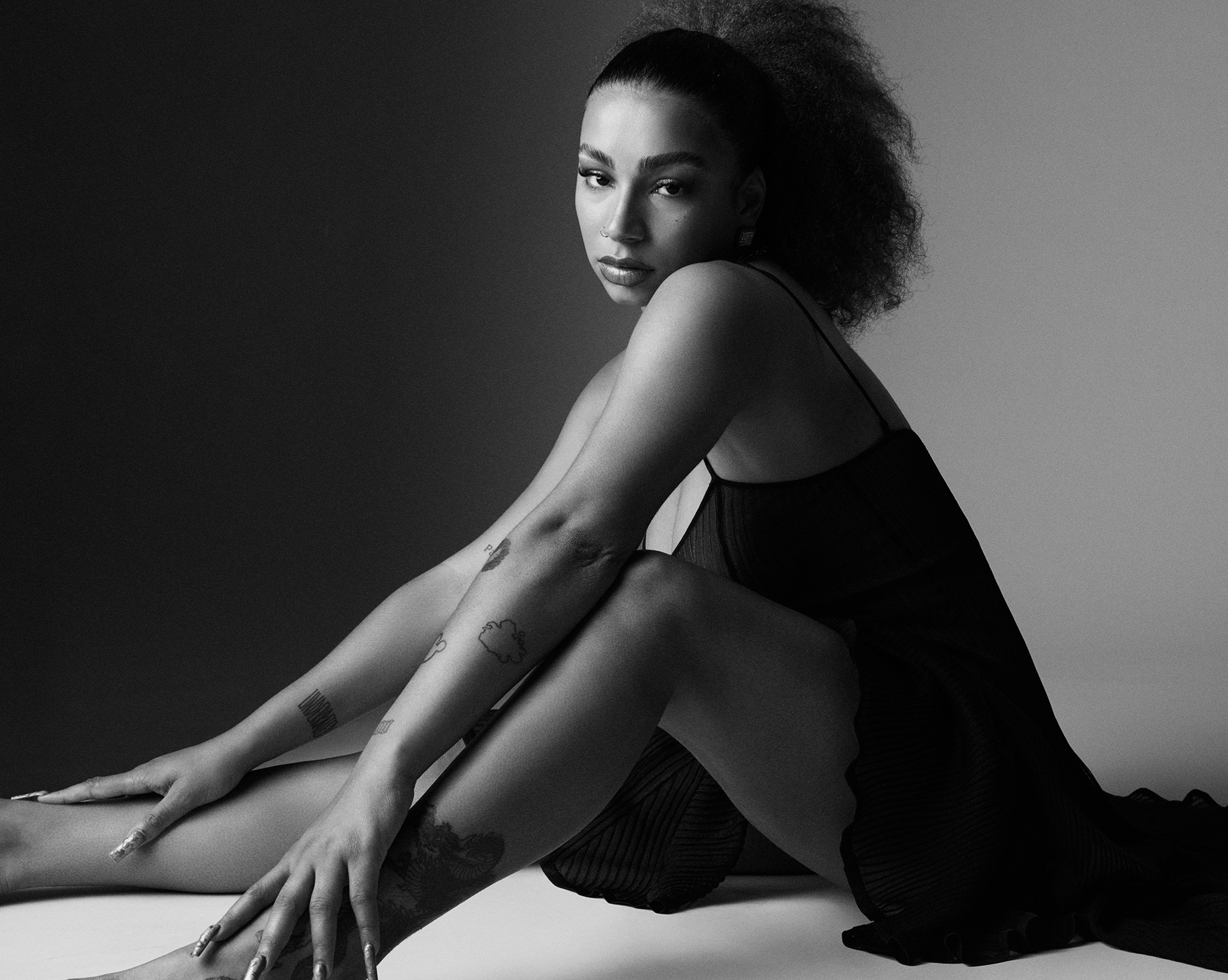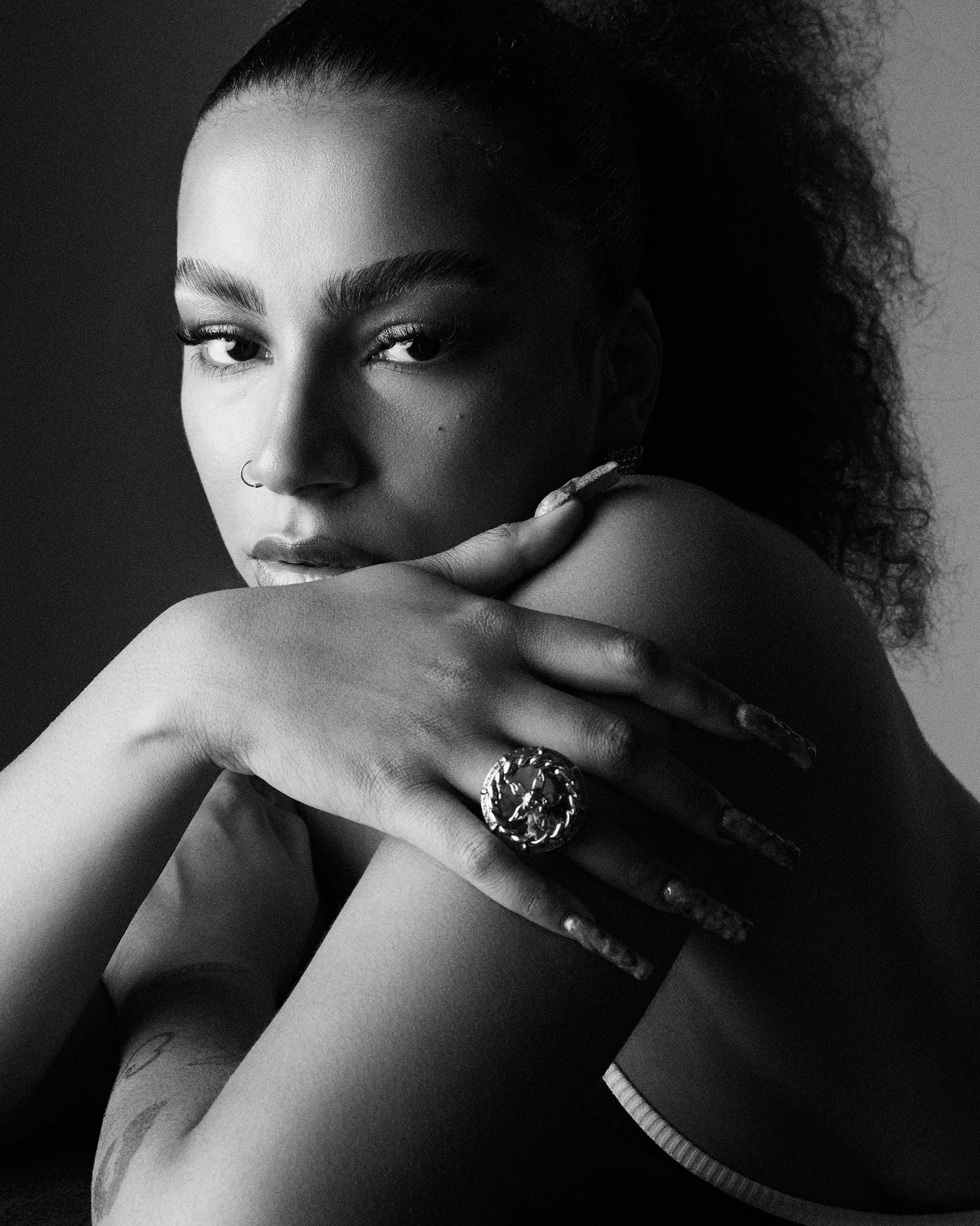LA NUEVA MOVIDA: DEVA
La cantante española Deva está lista para el éxito mundial

Fresh off the release of her boldest project yet “Black and Proud”, Spanish singer Deva is locked, loaded, and ready for global superstardom. Dominating the Madrid music scene with powerfully poetic lyrics, laced over an authentic fusion of reggaeton and pop beats, the rising songstress has carved out a niche of her own, and is now doubling down on the unapologetically authentic ethos that landed her in the limelight.

Spanish V: When did you realize you had a passion for creating music?
Deva: I always knew. But I tried to hide it from everyone because I felt embarrassed. I think I was 12 the first time I sang in front of my mother. Black artists in general inspired me. They all came from America, as there were no Black artists here in Spain. People like Kelly Rowland, Ciara, and Sevyn Streeter made me develop a different way of understanding music and therefore making it.
V: You just released “Black and Proud”—what prompted this project? It came at such an important time for Black people where we were banding together to address social issues.
D: The need to tell Spain we are Black and that we know we don’t have the same possibilities in the industry—most of the time, it is just statistics. Ergo has been in the rap game for so many years but some don’t recognize [that] he is a consecrated artist and an educator to younger generations about social commitment, as well as racial issues—a true natural role model. Speaking out and not keeping quiet in this country where people are scared to say that they are Black so they can just forget about it was the reason we decided to get in the studio together. It was fun—he is an excellent lyricist [and] I learned a lot about metrics and ad-libs. This project so far has been very much personal for me; getting together with The Iconics, Mumbai Moon, Camilo Perseo and AMO studio has to be the best decision I’ve made to elevate our idea.
V: What has your experience been as a person of color in Spain?
D: Complicated at times. When we are young, most people don’t understand themselves. The worst part as a Black person, in my case, was getting that I was different from my white colleagues. Once I started valuing it, nobody could tell me nothing or bully me because I knew who I was. Growing up half Black is having to defend your own identity all the time.
V: We’ve seen so much talent and creatives emerge from Spain over the last few years. What do you think has been the catalyst for this? Why do you think the world is paying more attention to Spain’s homegrown rising stars?
D: The globalization of Latin and Black music as well as a mixture of different sounds has eliminated barriers between genres so every form of art and music is valid. Having more tools to be auto sufficient and do our own music has also motivated people to go out and do their thing! We have a special way of pronouncing everything in Spain. Step-by-step, we have created our own national sounds which are interesting and still unknown for some, outside the country.
V: What does the future of Spain look like to you?
D: Like progress—I see a difference. Spanish artists are making the industry grow.
V: How has COVID and the lockdowns shaped you personally & professionally?
D: It has made me more patient, like everybody else. I choose where I spend the hours at work now, I have the lead which I didn’t have before. I’ve always been creative but I was missing some organization and attitude. I felt like I had nothing to tell people locked at home, I only sang. Quarantine was just the trigger for me to leave Sony and get to work.
V: What parts of Spanish culture influence you as an artist?
D: Just being in a market that’s more closed to the world inspires me to be different and personal. I found that investigating my roots and its sounds make me who I am—as if when I knew more, my whole concept was more complete.
V: As the world reopens, what is next for you?
D: Expanding my show and my fan base, bit-by-bit. I’m receiving many offers to sing for clubs and festivals but I’m planning to tour Spain and abroad after summer. I’ve been scared to organize my own shows but people recently seem to know all my songs so I want to lose that fear. My plan is to flow with some singles for now. I know I want to make an EP this year but the album process was so intense, I am good for now. I am excited about my recent decision to study theory. Talent is nothing if you don’t put in the hours and some fresh knowledge onto it.
See the Spanish translation below
Vea la traducción al español a bajo
Salido del lanzamiento de su proyecto más audaz hasta ahora, “Black & Proud”, la cantante española Deva está cargada y lista para el estrellato mundial. Dominando la escena musical de Madrid con letras poderosamente poéticas, mezcladas con una auténtica fusión de reggaetón y pop, la cantante en ascenso se ha labrado un nicho propio y ahora está duplicando el espíritu auténtico sin disculpas que la llevó al centro de atención.

Spanish V: ¿Cuándo te diste cuenta de que te apasionaba crear música?
Deva: Siempre lo supe. Pero traté de ocultarlo a todos porque me sentía avergonzada. Creo que tenía 12 años la primera vez que canté frente a mi madre. Los artistas negros en general me inspiraron. Todos venían de América, ya que no había artistas negros aquí en España. Personas como Kelly Rowland, Ciara, y Sevyn Streeter me hicieron desarrollar una forma diferente de entender la música y, por tanto, de crearla.
V: Acabas de publicar “Black & Proud”—¿Qué motivó este proyecto? Llegó en un momento tan importante para los negros en el que nos uníamos para abordar los problemas sociales.
D: La necesidad de decirle a España que somos negros y que sabemos que no tenemos las mismas posibilidades en la industria—la mayoría de las veces, son solo estadísticas. Ergo ha estado en el juego del rap durante tantos años, pero algunos no reconocen [que] es un artista consagrado y un educador para las generaciones más jóvenes sobre el compromiso social, así como los problemas raciales— un verdadero modelo natural a seguir. Hablar y no callar en este país donde la gente tiene miedo de decir que son negros para poder olvidarlo fue la razón por la que decidimos ir al estudio juntos. Fue divertido, es un excelente letrista [y] aprendí mucho sobre métricas e improvisaciones. Este proyecto hasta ahora ha sido muy personal para mí; reunirme con The Iconics, Mumbai Moon, Camilo Perseo y AMO Studio tiene que ser la mejor decisión que he tomado para elevar nuestra idea.
V: ¿Cuál ha sido tu experiencia como persona de color en España?
D: Complicado a veces. Cuando somos jóvenes, la mayoría de las personas no se comprenden a sí mismas. La peor parte como persona negra, en mi caso, fue entender que yo era diferente de mis colegas blancos. Una vez que empecé a valorarlo, nadie podía decirme nada o acosarme porque yo sabía quién era. Crecer mitad negro es tener que defender tu propia identidad todo el tiempo.
V: Hemos visto surgir tantos talentos y creativos de España en los últimos años. ¿Cuál crees que ha sido el catalizador de esto? ¿Por qué cree que el mundo está prestando más atención a las estrellas emergentes de cosecha propia de España?
D: La globalización de la música latina y negra, así como la mezcla de diferentes sonidos, ha eliminado las barreras entre los géneros, por lo que todas las formas de arte y música son válidas. ¡Tener más herramientas para ser autosuficientes y hacer nuestra propia música también ha motivado a la gente a salir y hacer lo suyo! Tenemos una forma especial de pronunciarnos en toda España. Paso a paso, hemos creado nuestros propios sonidos nacionales que son interesantes y aún desconocidos para algunos, fuera del país.
V: ¿Cómo te parece el futuro de España?
D: Como el progreso, veo una diferencia. Los artistas españoles están haciendo crecer la industria.
V: ¿Cómo le ha formado COVID y los bloqueos personal y profesionalmente?
D: Me ha hecho más paciente, como todos los demás. Elijo dónde paso las horas en el trabajo ahora, tengo la ventaja que no tenía antes. Siempre he sido creativo, pero me faltaba algo de organización y actitud. Sentía que no tenía nada que decirle a la gente encerrada en casa, solo cantaba. La cuarentena fue solo el detonante para dejar Sony y ponerme a trabajar.
V: ¿Qué partes de la cultura española te influyen como artista?
D: El simple hecho de estar en un mercado más cerrado al mundo me inspira a ser diferente y personal. Descubrí que investigar mis raíces y sus sonidos me hacen quien soy, como si cuando supiera más, todo mi concepto fuera más completo.
V: A medida que el mundo se reabre, ¿qué sigue para ti?
D: Expandiendo mi programa y mi base de fans, poco a poco. Recibo muchas ofertas para cantar en clubes y festivales, pero planeo hacer una gira por España y el extranjero después del verano. Tenía miedo de organizar mis propios shows, pero la gente parece conocer todas mis canciones, así que quiero perder ese miedo. Mi plan es fluir con algunos solteros por ahora. Si quiero hacer un EP este año, pero el proceso del álbum fue muy intenso, estoy bien por ahora. Estoy entusiasmado con mi reciente decisión de estudiar teoría. El talento no es nada si no le dedicas horas y nuevos conocimientos.
Discover More
